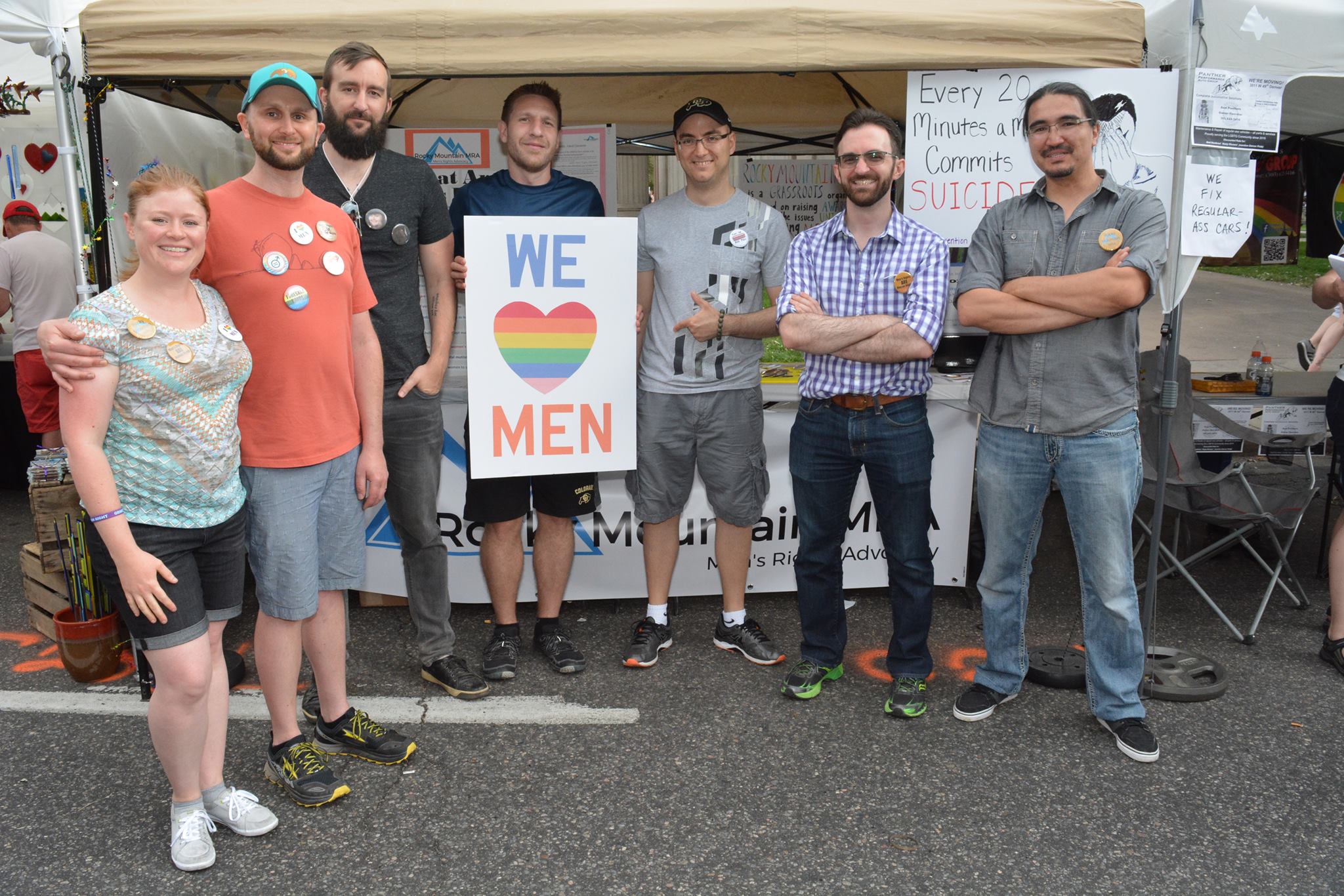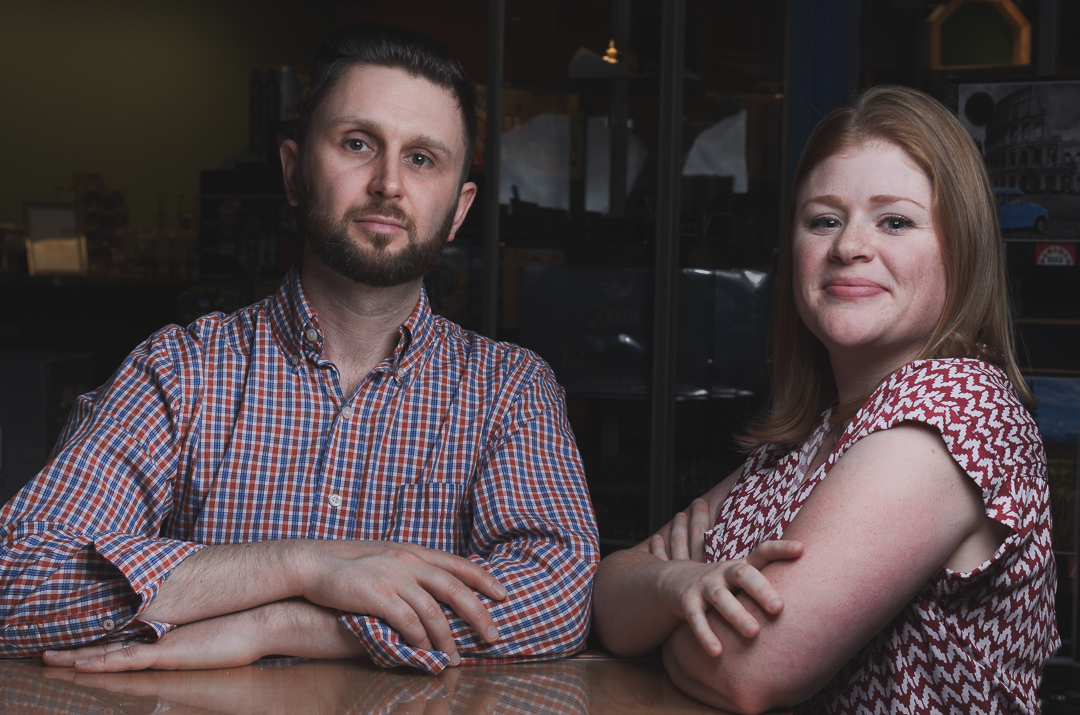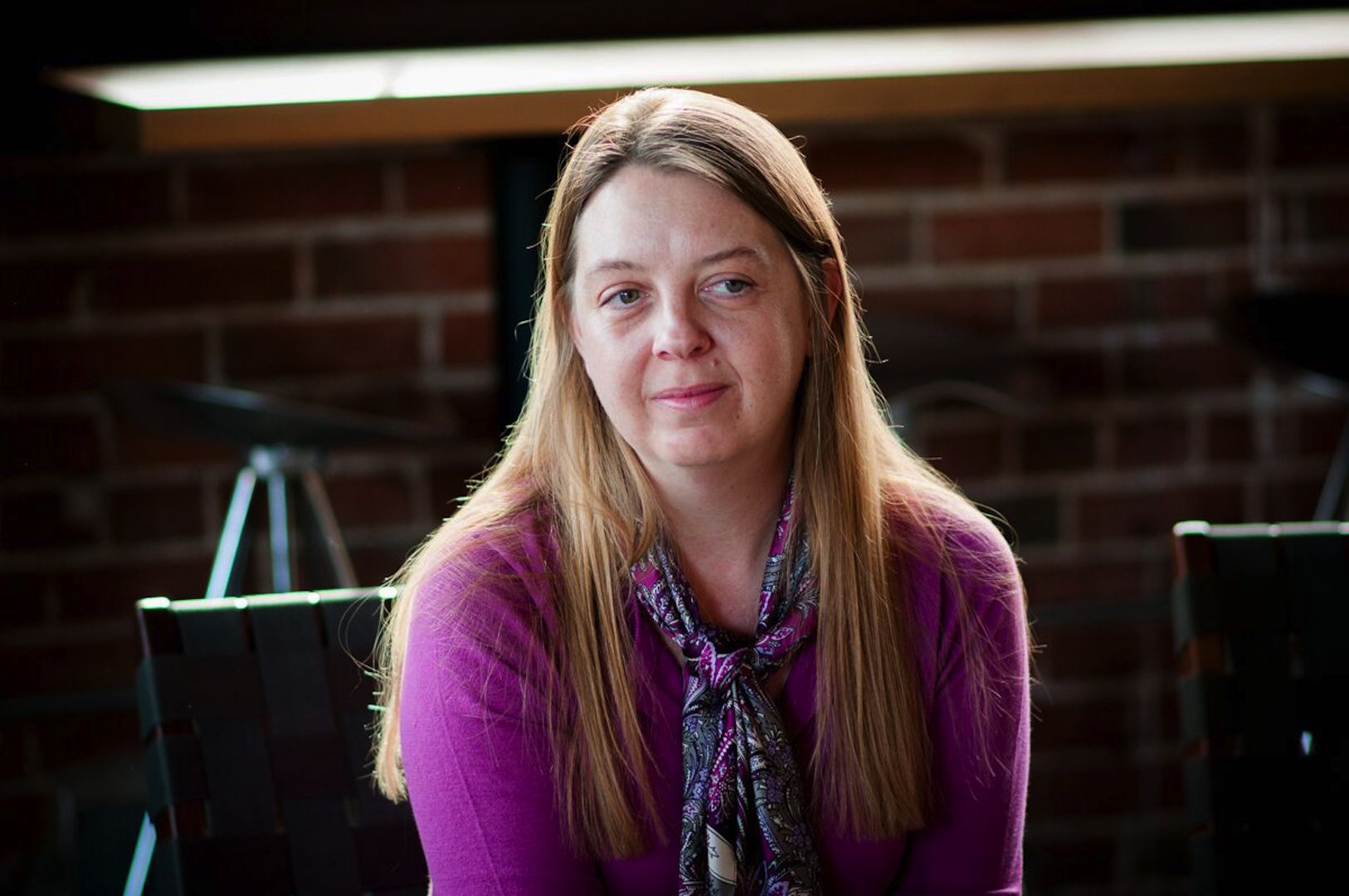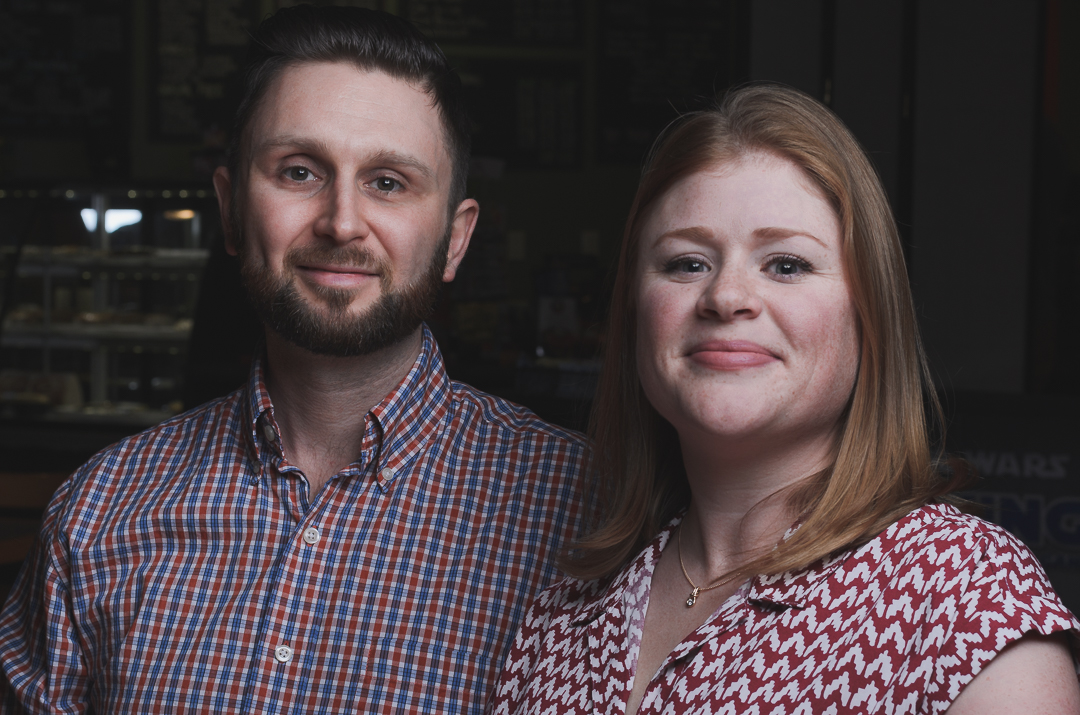Seven women in pointy black hats, their heads and torsos draped in black sheets, stand with arms locked in front of the Rocky Mountain Men’s Rights Advocacy (RMMRA) booth at Denver’s PrideFest in June.
One of the protestors plays a melodica while the rest chant: “MRAs [men’s rights activists] are a gateway to the alt-right!” “Men are dominators!” “Feminism uplifts all genders!”
The protesting group is Womxn’s [sic] International Troublemaker Conspiracy from Hell, or W.I.T.C.H., a Denver-based performance art group made up of “women, femmes and gender non-conforming folks…committed to fighting against patriarchy…violence against women…and all systems of oppression.”
Members of the group dress as witches to call attention to how, over history, women who have “spoken out against injustice…were ostracized, stigmatized and burned.”
Kat, 26, a Rocky Mountain Men’s Rights Advocacy board member and software developer, stands quietly behind her organization’s table, flanked by signs reading, “Every 20 minutes a man commits suicide” and “We [rainbow heart] men.”

“It’s really weird to me,” Kat said later about the protest. “It’s such an uncontroversial thought that men should be treated equally.”
Of course, such negative attention is nothing new for the men’s rights movement (MRM). Over the years, men’s rights activism has attracted some of the most vocal opposition of any social cause, including accusations of providing a platform for misogynist hate groups.
Perhaps one reason for the criticism is that men’s rights has a history of operating as a reactionary movement, according to Alexis de Coning, a doctoral student focusing on the Men’s Right Movement at the University of Colorado Boulder.
“As long as women’s suffrage and women’s emancipation movements have been around, there have been men reacting to that,” de Coning said.
Cheetah McClellan, teacher and co-organizer of the Women’s March on Denver, acknowledged that while men face real issues that should be addressed, she doesn’t see it so much as a lack of rights.
“Men have gotten a lot of attention, a lot of time to exert their power and control over things,” McClellan said. For instance, men make up 96 percent of the CEOs of Fortune 500 companies and hold 80 percent of the seats in Congress.
“Men are starting to feel afraid that women are going to start being dominant,” she said. “It feels backlash-y.”
“A primary goal of Rocky Mountain MRA is to build bridges between men’s rights advocacy and feminism so that the two can work together towards a more complete vision of gender equality.”
The modern MRM can be traced back to the ‘60s and ‘70s, with groups popping up in the wake of second-wave feminism. While de Coning sees some aspects of the MRM working in opposition to feminism, she also thinks that “some of the claims or grievances being put forward by men’s rights activists are actually very much in line with feminism.”
“But that doesn’t mean that we should excuse or gloss over instances of misogyny,” said de Coning. “The attitude held by some MRAs that women and feminists are a homogenous group who are to blame for men’s issues isn’t accurate, and it’s not productive.”
Aaron, 34, president and founder of RMMRA, is aware of the bad reputation of some MRAs. He stresses that the organization he helped start is, to the contrary, an “inclusive group that is not in any way, shape, or form anti-woman.”
“A primary goal of Rocky Mountain MRA,” Aaron said, “is to build bridges between men’s rights advocacy and feminism so that the two can work together towards a more complete vision of gender equality.”
Patriarchy and Privilege
Gloria, 25, is a self-identified feminist and a graduate of an “ultra-liberal college.” She said she was drawn to feminism because of its focus on the “insidious effects of gender on everyday life and larger societal trends.”
Gloria is also a member of Rocky Mountain MRA. Instead of seeing feminism and men’s rights activism as opposing ideologies, she believes they can operate in unison by tackling the “relationship between gender and behavior and gender expectations in society.”
One of the central tenets of modern feminism is what’s known as “patriarchy theory,” which portrays a world in which “men dominate women through a variety of political, economic and social structures,” according to the Routledge Encyclopedia of International Political Economy.
Jolie Brawner, co-organizer of the Denver Women’s March and executive director of the Washington Street Community Center, believes that tearing down the “patriarchal power structure” would not only liberate women, but “alleviate the struggles that men also face in society.”
While Gloria still sees the world through the lens of patriarchy, her take on it has “significantly changed.” These days, she views it as a “simplification of what’s happening in ruling classes instead of the general public.” In her opinion, it’s more someone’s economic class that acts as the deciding factor in who is privileged and who is oppressed, and not so much gender.
De Coning also questions the assumption that all men are automatically more privileged than women, despite a lower economic status. “If you’re a working class man in the rust belt, what is your privilege compared to a wealthy woman in California?” she asked.
Indeed, Gloria said men in our culture often get the short end of the stick, such as being forced into “dangerous or even illegal jobs in order to support their families.”
Lexie, 23, a RMMRA board member, takes things even further. She said that typically in society, “men are considered more disposable than women, men’s lives are valued less.”
A male-to-female transsexual who considers herself more left wing than any politician in the country, Lexie is extremely knowledgeable—and opinionated—about gender issues and how they play into today’s politics. Her life experiences have convinced her that men are often held to different standards than women, such as not being “taken as seriously if abused or hurt.”
“Which isn’t to say that women always have it great,” she clarified. “But they’re usually more protected and not expected to do the dirty work.”
Dirty Work

Holly, 31, is a Rocky Mountain MRA member and safety administrator for a company that works in the oil fields, whose employees are primarily men.
“These men are busting ass to provide for their families and in so many areas in society they’re being told that they’re not valued,” she said. “They’re literally putting themselves in hazardous conditions to provide for their wife and kids who are back home.”
There’s no disputing the fact that men hold the vast majority of the dangerous jobs in the US In 2015, 93 percent of the 4,492 workplace fatalities were men, according to the Bureau of Labor Statistics. But what accounts for this disproportion?
“We still live in a society that pressures men to be breadwinners,” de Coning said. “Feminists would identify that as patriarchy…men’s rights activists might see that as something else.”
Bryan, 35, is a musician and RMMRA’s vice president and co-founder. He thinks the pressure on men to become “workhorses” and measure up to society’s standards of success in order to gain respect, or find a partner with whom to start a family, forces some men to “go dead and hollow inside.”
He said the “consequence of treating men like cattle” is that men live an average of 4.8 years less than women and makeup 78 percent of suicides. He also thinks it plays a role in men being 93 percent of those incarcerated in state and federal prisons.
No one’s arguing that men shouldn’t be held accountable for the crimes they commit. Yet, studies have found that women arrestees are likelier to avoid charges and convictions and, if convicted, are twice as likely to avoid prison. Meanwhile, men receive 60 percent longer sentences than women for committing the same crimes.
Gloria is troubled by the fact that, while society accepts that gender plays a role in matters like workplace discrimination, “conveniently, when men are on the other side of it, it’s like it has nothing to do with gender. It’s just a problem that other people need to work out.”
Dads and Kids
Kat argues that men face other “legal inequalities” beyond the criminal justice system, particularly when it comes to divorce and child custody.
So does Sharon Liko, a Denver-based attorney who practices family law with a focus on men’s rights. “I represent men who would do anything to see their kids. I don’t represent deadbeat dads…I see guys who are really working hard,” she said.
Liko has seen instances of divorce where women have been “unreasonable and they are demanding too much financially. They want to be supported for the rest of their lives. They really don’t want what’s fair, they want everything.”
Liko has also been involved with cases of child custody in which women “use the kids as weapons” or try to “marginalize the father,” often resulting in courts siding against the men.

As of 2013, 82.5 percent of custodial parents are mothers, though factors other than court decisions also play a role, such as mutual agreements or fathers choosing not to be in their children’s lives.
While Liko said that there is still some bias when it comes to family courts, it’s become “less and less that way.” She attributed this change to courts taking child psychology studies into account which “recognize the value of fathers and how important it is for them to be involved in their kids’ lives.”
McClellan is also aware of family court decisions that, in some cases, have been slanted against men. “I know men that have been kept from their children, that in my opinion, they have every right and should be with their children. They’re wonderful fathers,” she said. “And I know men who shouldn’t even be in the room with anyone under the age of 25.”
Mental Health
A lot of men are drawn to the men’s rights movement because of their personal difficulties coping with a complicated and frustrating world.
Kat believes many men are confused by mixed messages from different elements of society, such as when they are “put down for holding the door or giving up a seat, and at the same time they’re demonized if they don’t do these things.”
Overall, Lexie thinks people aren’t “receptive to men suffering.” She said that men who try to get in touch with their emotions are frequently told that they “need to man up and not cry and not be a little bitch.”
De coning agrees that, as a society, we don’t “encourage boys to express their feelings.”
She said that sort of treatment “encourages men to not deal with a lot of their mental health and emotional well being.”
Brawner has seen this, too. “I think it’s put in conjunction with a lot of other ideas of outdated masculinity, it goes in hand with how strong and brave he is,” she said. “These stereotypes on both sides of what is expected of a man and what is expected of a woman, they hurt men and women.”
Aaron, RMMRA’s president, and recently celebrated two years of marriage to Holly. He said that a lot of the depression he suffered in his youth was because, as a “de facto feminist,” he felt shamed for having been born a man.
“Feminism seemed to put me in a box, telling me I was just a really negative force in the world as a man,” Aaron said. “I didn’t see any positive future for myself.”
Aaron said the men’s rights movement “helped me to change my perspective on what my role is in the world and gave me a sense of how I can be positive force in the world despite my gender.” He credits this change of heart as guiding his work as a nutrition therapist focused on men’s health.
Holly said her experience at PrideFest proved to her how the issue of men’s mental health resonates with people. “We had so many people come up to us and thank us for being there, and so many people with stories of their friends or brothers who committed suicide. They see how common it is and how little it’s talked about.”
“We had people come up and give us hugs, and start crying in our booth,” Holly said. “A lot of women, probably more women.”
Overlap
De Coning thinks that men’s rights and feminism have “very similar issues” but tend to come at them from “different angles.”
She cited the controversy surrounding male circumcision as a direct tie-in to women’s struggle against female genital mutilation and for abortion rights. “Of course we care about issues of bodily autonomy or giving men and boys the right to choose what happens to their bodies,” de Coning said.
Gloria agrees that the two movements have “more in common than they have different.” In fact, she thinks men’s rights activists should take a cue from some of the successes of feminism over the years. “If you’re trying to change how gender is perceived by society, feminism has a lot to teach.”
Holly, too, acknowledged that, “in order to make real changes in laws, we do need the support of feminists.”
But will feminists back the men’s rights movement?
McClellan is cautiously supportive. “I have a son, I have a husband, I have a dad, I know that they face very real issues,” she said. “Are they as prevalent, and as dominant and as obvious as women’s issues? Maybe not, but they’re very important nonetheless.”
“I think we’d probably get further if we try to figure out what we actually want together as a society, instead of posing it as a man versus woman issue,” de Coning said. “The antagonism, it’s not productive.”
Bryan points out that there’s already a word for the idea of all people deserving equal rights despite their sex. “Egalitarianism,” he said. “It’s in the dictionary.”
Moving Forward
The women and men of Rocky Mountain MRA accept that their cause isn’t widely embraced and, because of that, they’re not trying to run before they’ve learned how to walk.
“We want to be a force for good in our local community that helps men who are in dire straits and, by extension, all the people who are in their lives,” Aaron said. “We’re starting with raising awareness and moving on to more policy changes once we’re more able to do that.”
The more people become aware of men’s rights issues, Kat said, “the more positive change we can make, the more people we can help, and the closer to equality we can get.”
Lexie points out some specific policy issues she’d like to see addressed, including more businesses providing paternity leave, changing alimony laws, and implementing better safety measures on the job.
“I want to at least signal that men and these issues matter,” Bryan said. “I want to show other men that people care, and I want them to know that people see that they’re suffering and are at least willing to talk about it…the more people talk about it, the more the chance the issues will get fixed.”
Lexie likens today’s situation with men’s rights to the early years of the gay rights movement. Back then, much of society “saw gay people as needing to change themselves, and I think that a lot of people want men to change in their own image.”
She said there’s been a lot of victim blaming when it comes to both groups. “When you showed the statistics of gay suicides, or STD rates, people would think they brought it onto themselves.”
“And people will say that about men’s suicide rates, the prison sentencing gap… that men are bringing it onto themselves,” she said. “As if there were something inherently wrong with being a man.”







[Members of the group dress as witches to call attention to how, over history, women who have “spoken out against injustice…were ostracized, stigmatized and burned.”]
Name two.
They prefer to stay anonymous and protect their anonymity by covering their faces. You may find a tattoo on their arms or legs that would out who they were. Maybe even shoes or a piece of jewelry but that’s about it.
Quote from W.I.T.C.H. website (http://witchpdx.com): WE USE ANONYMITY AS A TOOL TO DISMANTLE THE WHITE SUPREMACIST PATRIARCHY
They use the image of witches due to their misunderstanding of the Salem Witch Trials and witch history in general. Their misunderstanding likely has been influenced by Arthur Miller’s The Crucible which may have framed their understanding of witch history. They may even have believed parts as historical fact rather than historical fiction utilizing artistic license for entertainment’s sake. No matter what, they hardly have proven to know the entire story. (Salem Witch Trials is their biggest claim to oppression). Additionally, movies and television have portrayed witches as ugly, old women who are malicious and should be stopped (maybe they would use the word oppressed). This portrayal is almost a stereotype or archetype at this point and some who feel connected to witches in terms of oppression have major issues with this “defaming” portrayal and in fact see it as proof of the oppression.
Really, they just feel a connection to the underdog character but they need it to be a woman who has powers greater than man (human) and has a connection to mother nature and that leaves them with the broad definition of witch.
This information comes only from my personal experience with people who think this way and would likely be a part of this movement.
Could I give you names of those who are likely involved? Yes.
Could I name two confirmed members for you? No.
Would I like it if their ignorance was corrected? You bet.
Lol I love it that you tried to mansplain The Crucible but clearly have no fucking idea what it’s about.
Zinnia,
You hurt my feelings.
Want to apologize or should I man up?